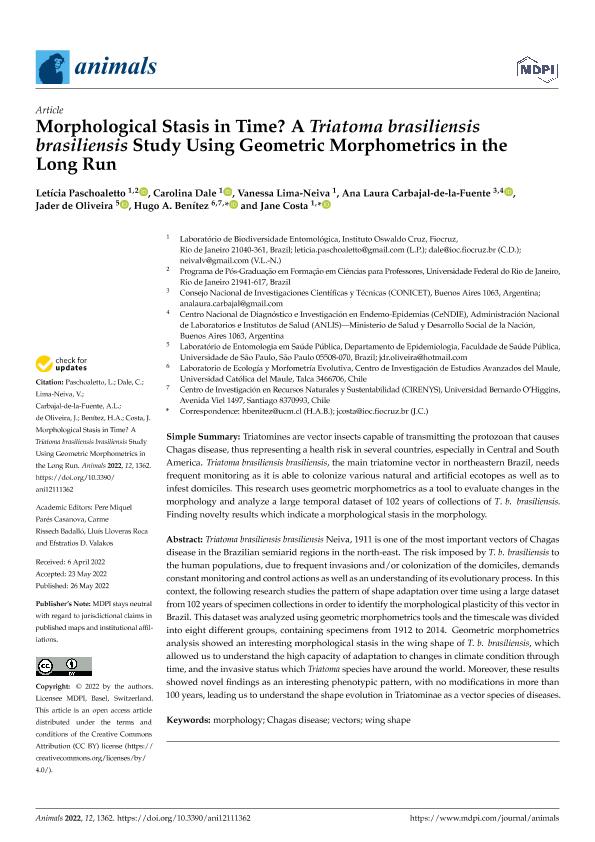Mostrar el registro sencillo del ítem
dc.contributor.author
Paschoaletto, Letícia
dc.contributor.author
Dale, Carolina
dc.contributor.author
Lima Neiva, Vanessa
dc.contributor.author
Carbajal de la Fuente, Ana Laura

dc.contributor.author
de Oliveira, Jader
dc.contributor.author
Benítez, Hugo A.
dc.contributor.author
Costa, Jane
dc.date.available
2023-02-13T16:57:38Z
dc.date.issued
2022-06
dc.identifier.citation
Paschoaletto, Letícia; Dale, Carolina; Lima Neiva, Vanessa; Carbajal de la Fuente, Ana Laura; de Oliveira, Jader; et al.; Morphological Stasis in Time? A Triatoma brasiliensis brasiliensis Study Using Geometric Morphometrics in the Long Run; Multidisciplinary Digital Publishing Institute; Animals; 12; 11; 6-2022; 2-12
dc.identifier.issn
2076-2615
dc.identifier.uri
http://hdl.handle.net/11336/187779
dc.description.abstract
Triatoma brasiliensis brasiliensis Neiva, 1911 is one of the most important vectors of Chagas disease in the Brazilian semiarid regions in the north-east. The risk imposed by T. b. brasiliensis to the human populations, due to frequent invasions and/or colonization of the domiciles, demands constant monitoring and control actions as well as an understanding of its evolutionary process. In this context, the following research studies the pattern of shape adaptation over time using a large dataset from 102 years of specimen collections in order to identify the morphological plasticity of this vector in Brazil. This dataset was analyzed using geometric morphometrics tools and the timescale was divided into eight different groups, containing specimens from 1912 to 2014. Geometric morphometrics analysis showed an interesting morphological stasis in the wing shape of T. b. brasiliensis, which allowed us to understand the high capacity of adaptation to changes in climate condition through time, and the invasive status which Triatoma species have around the world. Moreover, these results showed novel findings as an interesting phenotypic pattern, with no modifications in more than 100 years, leading us to understand the shape evolution in Triatominae as a vector species of diseases.
dc.format
application/pdf
dc.language.iso
eng
dc.publisher
Multidisciplinary Digital Publishing Institute

dc.rights
info:eu-repo/semantics/openAccess
dc.rights.uri
https://creativecommons.org/licenses/by/2.5/ar/
dc.subject
CHAGAS DISEASE
dc.subject
MORPHOLOGY
dc.subject
VECTORS
dc.subject
WING SHAPE
dc.subject.classification
Zoología, Ornitología, Entomología, Etología

dc.subject.classification
Ciencias Biológicas

dc.subject.classification
CIENCIAS NATURALES Y EXACTAS

dc.title
Morphological Stasis in Time? A Triatoma brasiliensis brasiliensis Study Using Geometric Morphometrics in the Long Run
dc.type
info:eu-repo/semantics/article
dc.type
info:ar-repo/semantics/artículo
dc.type
info:eu-repo/semantics/publishedVersion
dc.date.updated
2023-02-08T15:36:49Z
dc.journal.volume
12
dc.journal.number
11
dc.journal.pagination
2-12
dc.journal.pais
Suiza

dc.journal.ciudad
Basel
dc.description.fil
Fil: Paschoaletto, Letícia. Universidade Federal do Rio de Janeiro; Brasil. Fundación Oswaldo Cruz; Brasil
dc.description.fil
Fil: Dale, Carolina. Instituto Oswaldo Cruz; Brasil
dc.description.fil
Fil: Lima Neiva, Vanessa. Instituto Oswaldo Cruz; Brasil
dc.description.fil
Fil: Carbajal de la Fuente, Ana Laura. Dirección Nacional de Institutos de Investigación. Administración Nacional de Laboratorios e Institutos de Salud. Centro Nacional de Diagnóstico e Investigaciones Endemo-epidémicas; Argentina. Consejo Nacional de Investigaciones Científicas y Técnicas; Argentina
dc.description.fil
Fil: de Oliveira, Jader. Universidade de Sao Paulo; Brasil
dc.description.fil
Fil: Benítez, Hugo A.. Universidad Catolica de Maule; Chile
dc.description.fil
Fil: Costa, Jane. Instituto Oswaldo Cruz; Brasil
dc.journal.title
Animals

dc.relation.alternativeid
info:eu-repo/semantics/altIdentifier/url/https://www.mdpi.com/2076-2615/12/11/1362
dc.relation.alternativeid
info:eu-repo/semantics/altIdentifier/doi/http://dx.doi.org/10.3390/ani12111362
Archivos asociados
